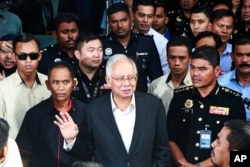Malaysia's 92-year-old prime minister, Mahathir Mohamad, is determined to restore the country's reputation and his legacy, having wrested back leadership following national elections in early May. During his previous 22-year rule, Mahathir built the small former British colony into one of Asia’s proudest economic powerhouses, only to see it reduced to mockery under corruption scandals that resembled movie scripts.
In an interview with VOA following his stunning electoral upset over Prime Minister Najib Razak, Mahathir was steadfast on the need for reform and said his earlier tenure in no way contributed to subsequent abuses of power - such as the allegations facing Najib.
“Well, my first 20 years as prime minister was fairly easy. I inherited a system that is already there. All I have to do is introduce new ideas so that we can expedite the growth and development of Malaysia,” he said of that tenure, which ended in 2003.
“But here I am dealing with a country that has actually been destroyed,” he added, referring to the recent scandals.
One highly publicized scandal links Najib to the disappearance of hundreds of millions of dollars from a state fund, 1 Malaysia Development Berhad, which the ousted prime minister set up in 2009 for infrastructure projects.
Najib, who has now been repeatedly brought before the Malaysian Anti-Corruption Commission, has denied any wrongdoing.
Najib is also linked to alleged scams involving the Federal Land Development Authority, the Employees Provident Fund and other state institutions, and to huge contracts signed with borrowed money for infrastructure projects of questionable value.
Mahathir Monday canceled one of those projects — a multi-billion-dollar high-speed rail project connecting Kuala Lumpur and Singapore, calling it expensive and unnecessary.
Also in his sights is the more than $18 billion Chinese-backed East Coast Rail Link project, which he said was “not viable” and needed to be renegotiated.
Mahathir told VOA his government has already found ways to wipe out about a fifth of Malaysia’s foreign debt, which ballooned to more than $250 billion under Najib.
He said the international perception of Malaysia as a country “governed by crooks” is one that has to be remedied so that foreigners will once again find it is well-governed and worthy of investments that actually benefit the nation.
“Whatever you may say about my period as prime minister before, the fact is that lots of people look at Malaysia as a great place to do business with, and we had huge foreign investment in this country, and this country grew at a very high rate during that period,” he said.
Returning to that kind of prosperity, Mahathir said, was largely a matter of returning the rule of law - something the prime minister said he could be trusted to do, while adding that Najib abused that trust.
Pending checks on authorities include fixed term limits for prime ministers and parliamentary oversight of senior political appointments, and proper separation of the three branches of government, Mahathir said.
As for his seemingly authoritarian use of executive instruments such as the Internal Security Act to jail political opponents and shut down critical press during his rule, Mahathir said he sees no connection to what transpired after he stepped down in 2003.
“They were not abuses; they were within the law as the law provided at that time. Of course, the law was harsh, and the law was inherited from my predecessors who also used the same law,” he said.
“But what has happened is the same laws were in place when I stepped down. It is the abuse of those laws that has led to the present condition in Malaysia.”
Mahathir said he believes he has been demonized by former political opponents and misleadingly characterized as authoritarian by the foreign press.
Wong Chin Huat, a political scientist at the Penang Institute in Malaysia, said Mahathir destroyed judicial independence and many state institutions and must shoulder some of the blame for what followed his tenure.
“It was a flawed system. He reinforced the system so much so that the system became like a fortress that is so hard to conquer. With a flawed character like Najib occupying that fortress, he just became very resilient,” Wong said.
Recent decisions, though, suggested Mahathir was committed to reform and true separation of power, said Wong.
“His commitment actually surprised me,” Wong said. He noted Mahathir's recent decisions to resign as education minister after realizing that holding the post was a conflict of interest, and for Pakatan Harapan, the coalition that supported him, to stop taking in problematic defectors from the ousted Barisan Nasional coalition, which Najib headed.
Wong said that for lasting, genuine democracy to take root, Malaysians must tackle the difficult challenge of how to build an effective opposition in a complex, multiracial society.
“I think a lot of people are still celebrating the fact that we have a good government. But no good government lasts unless you have a good opposition. You need a good opposition to check on them, to be prepared to stand in and replace them,” he said.
“But if you suppress the opposition, a desperate opposition may take desperate measures and desperate positioning that eventually makes itself unelectable, and therefore the government can afford to be corrupt, can afford to abuse power.”








